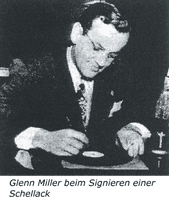Glenn Miller
1904 - 1944
These
were the last words of Don Haynes, before Major Glenn Miller boarded the
single-engine, nine-seater C-64 Norseman on December 15, 1994, a foggy
and cold day of bad weather.

When one considers that Major Miller had a real fear of flying, one can only too clearly imagine what these days must have been like for him. Everything that happened from then on, I think, we already know.
 Glenn Miller wasn’t only the most beloved bandleader
of his time, but also by far the best. His musical lines, which he envisioned
strictly in black and white, didn’t bring him many friends, but
made him famous. His hard headed business manner also allowed for him
to ask for $100,000 to play the music in the film “Orchestra Wives”
– and get that incredible sum without question and gain even more
popularity in America. Many fans went to see the movie just to hear the
music of Glenn Miller.
Glenn Miller wasn’t only the most beloved bandleader
of his time, but also by far the best. His musical lines, which he envisioned
strictly in black and white, didn’t bring him many friends, but
made him famous. His hard headed business manner also allowed for him
to ask for $100,000 to play the music in the film “Orchestra Wives”
– and get that incredible sum without question and gain even more
popularity in America. Many fans went to see the movie just to hear the
music of Glenn Miller.
A chance for two more films in the Fall of 1942 didn’t pan out. This is because Miller broke up his band, to give something back to the profession, and to bring American GI’s musical greetings from home. With musicians from the best bands around, he put together his AAF Band. In a letter to Jerry Gray, Miller explained: “Even when you’re getting yourself measured for a new suit, I’m sure you could be writing a 14-voice arrangement for the AAF!”
During this time, his ideas were constantly boycotted by jealous military
officers, but in the end he was still able to achieve his goals. He was
able to organize, in the usual Miller manner, his musicians. In this band,
too, he strove for total perfection. Soon enough, people talked only about
the truly professional, excellently trained, and very disciplined AAF
Band of Glenn Miller.
Many other Big Bands were formed during the Second World War, but Glenn
Miller was the best. Today, there are numerous bands with “Glenn
Miller” in their name who play in the way they believe Miller would
sound today. But I believe that if that were so, it would be the recipe
for success for today’s bands who copy the Miller sound.